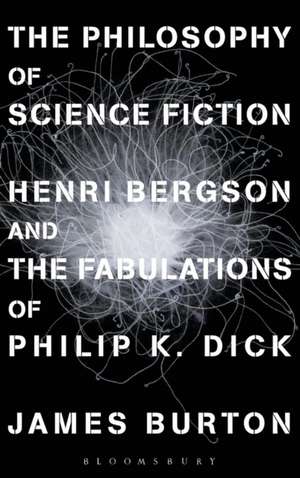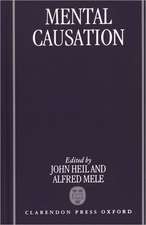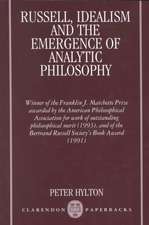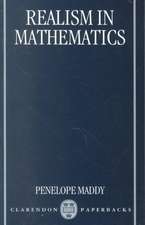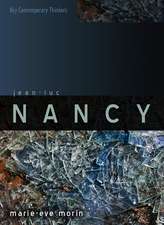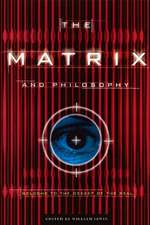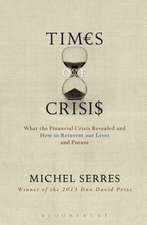The Philosophy of Science Fiction: Henri Bergson and the Fabulations of Philip K. Dick
Autor James Edward Burtonen Limba Engleză Hardback – 23 sep 2015
| Toate formatele și edițiile | Preț | Express |
|---|---|---|
| Paperback (1) | 186.35 lei 6-8 săpt. | |
| Bloomsbury Publishing – 17 mai 2017 | 186.35 lei 6-8 săpt. | |
| Hardback (1) | 773.88 lei 6-8 săpt. | |
| Bloomsbury Publishing – 23 sep 2015 | 773.88 lei 6-8 săpt. |
Preț: 773.88 lei
Preț vechi: 1112.97 lei
-30% Nou
Puncte Express: 1161
Preț estimativ în valută:
148.11€ • 154.03$ • 123.94£
148.11€ • 154.03$ • 123.94£
Carte tipărită la comandă
Livrare economică 15-29 martie
Preluare comenzi: 021 569.72.76
Specificații
ISBN-13: 9781474227667
ISBN-10: 147422766X
Pagini: 248
Ilustrații: 5 bw illus
Dimensiuni: 156 x 234 x 16 mm
Greutate: 0.53 kg
Editura: Bloomsbury Publishing
Colecția Bloomsbury Academic
Locul publicării:London, United Kingdom
ISBN-10: 147422766X
Pagini: 248
Ilustrații: 5 bw illus
Dimensiuni: 156 x 234 x 16 mm
Greutate: 0.53 kg
Editura: Bloomsbury Publishing
Colecția Bloomsbury Academic
Locul publicării:London, United Kingdom
Caracteristici
An exploration of 'fabulation' and its significance across philosophy, theology, posthuman thought, metafiction, postmodernism, ecology and literary studies
Notă biografică
James Burton is a research fellow at the Institute for Cultural Inquiry in Berlin, Germany. A former Alexander von Humboldt fellow, he has been a lecturer at the universities of Goldsmiths, Kent and Klagenfurt. His interdisciplinary research across philosophy, literature, cultural and media studies, concerns the myriad critical, cultural and ethical relationships between fiction, technology and the posthuman.
Cuprins
Acknowledgments Note on References Introduction Philosophy and Science Fiction The Edge of the Known The Ethics of Balking Philip K. Dick Studies Note on Terminology: Fabulation Chapter One: Fabulation: Counteracting Reality Mechanization and the War-instinct The Biological Origins of Society Countering the Intellect The Morality of Violence Open Morality and the Misdirection of Mechanism True Mysticism: Immanent Salvation An Incomplete Soteriology Fabulation for the Open ConclusionChapter Two: Fabulating Salvation in Four Early Novels Solar Lottery The World Jones Made Vulcan's Hammer Time Out of Joint Conclusion: Super-everyman to Solar Shoe SalesmanChapter Three: The Empire That Never Ended The Open and the Universal The Life-Death Chiasmus The Fictitious Event The Messianic Tension The Remnant and Messianic Time The Magic of Language Sci-fi: the genre of 'as not' Conclusion: Gnostic Politics Chapter Four: Objects of Salvation: The Man in the High Castle The Fabulation of History Mechanization and Paralysis Worldly Remains Openings Between Worlds The Tyranny of the Concrete Objects of Salvation Conclusion: Reality FieldsChapter Five: How We Became Post-Android The Mechanization of Pot-healing The Alien God The Saviour in Need Robot Theology Humans: the Cosmic Bourgeoisie Android and Theoid Creative Destruction Conclusion Chapter Six: The Reality of Valis Salvator Salvandus The Believer and the Sceptic The Pharmakonic God Reduplicative Paramnesia (Time Becomes Space) The Fabulative Cure Recursion: Valis as Limitlessly Iterative Soteriology Befriending God Conclusion Epilogue: Soter-ecologies Notes Bibliography Index
Recenzii
Through a lucid exposition of Bergson and a careful analysis of Dick's novels, [Burton] convincingly argues for their compatible views of salvation ... [His] study is innovative, elegantly written, and not only will it be of interest for scholars of cultural studies and philosophy, but also for science studies scholars.
Thinking through the work of Philip K. Dick alongside the philosophy of Henri Bergson is no mere contrivance. By showing how each was writing at the edge of knowledge, both theirs and ours, Burton has fabulated a new thought with truly evental consequences for metafiction, ecology, and theology.
In a brilliant act of superimposition, James Burton brings Henri Bergson's evolutionary mysticism to bear on the divine invasions-in fiction and in life-of S-F writer Philip K. Dick. The vision of "immanent soteriology" that emerges, in which transcendent fictions jam the engines of necessity, not only illuminates the method behind Dick's madness but reveals the crucial emancipatory role that fabulation can and does play within posthuman thought and religion. With clear thinking and graceful writing, Burton boldly indicates a "perturbation in the reality field" of contemporary materialism.
In investigating both the prolific and controversial science fiction novelist Philip K. Dick (1928-82) and Henri Bergson (1851-1941), whom William James deemed an intellectual genius, Burton (Institute for Cultural Inquiry, Berlin) takes a bifurcated path. Examining the strange affinity between these two seemingly different thinkers, the author navigates ideas of mechanism and mysticism, immanence and transcendence, and the possibility and meaning of soteriology. Both Dick and Bergson balked at the push toward mechanization, in which destruction of the planet seemed so immanent (as it still does today). Only collaboration between a science fiction writer and a philosopher could lead, Burton argues, to a realistic outlook that sutures contradictory imperatives. Their respective approaches may be said to fuse in fictionalizing/fabulation, which is a powerful tool of mechanization, yet is also capable of implementing a device for its undoing. This reviewer's favorite chapter deals with Dick's Do Androids Dream of Electric Sheep? (1968), adapted for the screen as Blade Runner in 1982 under the direction of Ridley Scott. Here the author covers provocative themes like robot theology, creative destruction, and salvation. Summing Up: Recommended. Upper-division undergraduates through faculty.
Thinking through the work of Philip K. Dick alongside the philosophy of Henri Bergson is no mere contrivance. By showing how each was writing at the edge of knowledge, both theirs and ours, Burton has fabulated a new thought with truly evental consequences for metafiction, ecology, and theology.
In a brilliant act of superimposition, James Burton brings Henri Bergson's evolutionary mysticism to bear on the divine invasions-in fiction and in life-of S-F writer Philip K. Dick. The vision of "immanent soteriology" that emerges, in which transcendent fictions jam the engines of necessity, not only illuminates the method behind Dick's madness but reveals the crucial emancipatory role that fabulation can and does play within posthuman thought and religion. With clear thinking and graceful writing, Burton boldly indicates a "perturbation in the reality field" of contemporary materialism.
In investigating both the prolific and controversial science fiction novelist Philip K. Dick (1928-82) and Henri Bergson (1851-1941), whom William James deemed an intellectual genius, Burton (Institute for Cultural Inquiry, Berlin) takes a bifurcated path. Examining the strange affinity between these two seemingly different thinkers, the author navigates ideas of mechanism and mysticism, immanence and transcendence, and the possibility and meaning of soteriology. Both Dick and Bergson balked at the push toward mechanization, in which destruction of the planet seemed so immanent (as it still does today). Only collaboration between a science fiction writer and a philosopher could lead, Burton argues, to a realistic outlook that sutures contradictory imperatives. Their respective approaches may be said to fuse in fictionalizing/fabulation, which is a powerful tool of mechanization, yet is also capable of implementing a device for its undoing. This reviewer's favorite chapter deals with Dick's Do Androids Dream of Electric Sheep? (1968), adapted for the screen as Blade Runner in 1982 under the direction of Ridley Scott. Here the author covers provocative themes like robot theology, creative destruction, and salvation. Summing Up: Recommended. Upper-division undergraduates through faculty.
